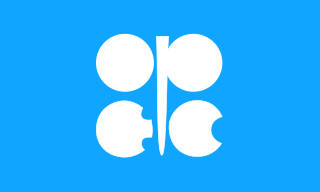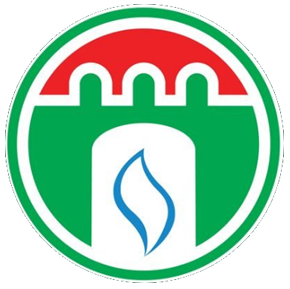
The United Nations Economic Commission for Europe is one of the five regional commissions under the jurisdiction of the United Nations Economic and Social Council. It was established in order to promote economic cooperation and integration among its member states.

The Organization of the Petroleum Exporting Countries is an organization enabling the co-operation of leading oil-producing countries in order to collectively influence the global oil market and maximize profit. It was founded on 14 September 1960 in Baghdad by the first five members. The 12 member countries account for an estimated 30 percent of global oil production.

The Iraq Petroleum Company (IPC), formerly known as the Turkish Petroleum Company (TPC), is an oil company that had a virtual monopoly on all oil exploration and production in Iraq between 1925 and 1961. It is jointly owned by some of the world's largest oil companies and headquartered in London, England. However, today it is only a paper entity with historical rights and plays no part in the modern development of Middle Eastern oil.

The U.S. Energy Information Administration (EIA) is a principal agency of the U.S. Federal Statistical System responsible for collecting, analyzing, and disseminating energy information to promote sound policymaking, efficient markets, and public understanding of energy and its interaction with the economy and the environment. EIA programs cover data on coal, petroleum, natural gas, electric, renewable and nuclear energy. EIA is part of the U.S. Department of Energy.

The Mexican oil expropriation was the nationalization of all petroleum reserves, facilities, and foreign oil companies in Mexico on March 18, 1938. In accordance with Article 27 of the Constitution of 1917, President Lázaro Cárdenas declared that all mineral and oil reserves found within Mexico belong to "the nation", i.e., the federal government. The Mexican government established a state-owned petroleum company, Petróleos Mexicanos, or PEMEX. For a short period, this measure caused an international boycott of Mexican products in the following years, especially by the United States, the United Kingdom, and the Netherlands, but with the outbreak of World War II and the alliance between Mexico and the Allies, the disputes with private companies over compensation were resolved. The anniversary, March 18, is now a Mexican civic holiday.

A transmission system operator (TSO) is an entity entrusted with transporting energy in the form of natural gas or electrical power on a national or regional level, using fixed infrastructure. The term is defined by the European Commission. The certification procedure for transmission system operators is listed in Article 10 of the Electricity and Gas Directives of 2009.

Kuwait Petroleum Corporation is Kuwait's national oil company, headquartered in Kuwait City.

Energy security is the association between national security and the availability of natural resources for energy consumption. Access to cheaper energy has become essential to the functioning of modern economies. However, the uneven distribution of energy supplies among countries has led to significant vulnerabilities. International energy relations have contributed to the globalization of the world leading to energy security and energy vulnerability at the same time.

Canada has access to all main sources of energy including oil and gas, coal, hydropower, biomass, solar, geothermal, wind, marine and nuclear. It is the world's second largest producer of uranium, third largest producer of hydro-electricity, fourth largest natural gas producer, and the fifth largest producer of crude oil. In 2006, only Russia, the People's Republic of China, the United States and Saudi Arabia produce more total energy than Canada.

QatarEnergy, formerly Qatar Petroleum (QP), is a state owned petroleum company of Qatar. The company operates all oil and gas activities in Qatar, including exploration, production, refining, transport, and storage. The President & CEO is Saad Sherida al-Kaabi, Minister of State for Energy Affairs. The company's operations are directly linked with state planning agencies, regulatory authorities, and policy making bodies. Together, revenues from oil and natural gas amount to 60% of the country's GDP. As of 2018 it was the third largest oil company in the world by oil and gas reserves. In 2022, the company had total revenues of US$52bn, a net income of US42.4bn, and total assets of US$162bn. In 2021, QatarEnergy was the fifth largest gas company in the world.

GAIL (India) Limited is a central public sector undertaking. It has the following business segments: natural gas, liquified natural gas, liquid hydrocarbon, liquefied petroleum gas transmission, petrochemicals, city gas distribution, renewable energy including solar & wind, exploration and production, GAILTEL and electricity generation. GAIL was given the Maharatna status on the 1 February 2013 by the Indian Government, a status which 11 other Public Sector Undertakings (PSUs) have.

Oman LNG is a LNG plant in Qalhat near Sur, Oman. The company was established by the Royal decree of Sultan Qaboos of Oman in 1994. The construction was launched in November 1996, and the plant was commissioned in September 2000. Oman LNG operates three LNG trains with a total capacity of 10.4 million tonnes per year. The company's production facilities are located on the coast at Qalhat near Sur in the South Sharqiyah Governorate, Oman.

The Japan Crude Cocktail (JCC) is the informal nickname given to the pricing index of Crude Oil used in most East Asian countries. The JCC is the average price of customs-cleared crude oil imports into Japan and is published by the Petroleum Association of Japan. The official name of the JCC is the Japan Customs-cleared Crude Oil Price. The valuation of the JCC closely reflects the market state of supply and demand. Clear fluctuations in JCC pricing can be linked to distinct events such as the 2007-08 Global Financial Crisis and the 2011 Fukushima Disaster.

The impact of the petroleum industry has been increasing globally as China ranks seventh for oil production and second in crude oil consumption in the world. China imported a record 6.7 million barrels a day (b/d) of oil in 2015 and was forecast "to overtake the U.S. as the world's biggest crude importer in 2016".
The Washington Agreement was a peace agreement that led to the modern Bosnia and Herzegovina, signed in 1994.

Petroleum has been a major industry in the United States since shortly after the oil discovery in the Oil Creek area of Titusville, Pennsylvania, in 1859. The industry includes exploration, production, processing (refining), transportation, and marketing of natural gas and petroleum products. In 2018, the U.S. became the world's largest crude oil producer, producing 15% of global crude oil, surpassing Russia and Saudi Arabia. The leading oil-producing area in the United States in 2019 was Texas, followed by the offshore federal zone of the Gulf of Mexico, North Dakota and New Mexico. In 2020, the top five U.S. oil-producing states were Texas (43%), North Dakota (10.4%), New Mexico (9.2%), Oklahoma (4.1%), and Colorado (4.0%).

The energy policy of Malaysia is determined by the Malaysian Government, which address issues of energy production, distribution, and consumption. The Department of Electricity and Gas Supply acts as the regulator while other players in the energy sector include energy supply and service companies, research and development institutions and consumers. Government-linked companies Petronas and Tenaga Nasional Berhad are major players in Malaysia's energy sector.
Petrolsoft Corporation (1989–2000) was a supply chain management software company with a focus on the petroleum industry. Petrolsoft Corporation was founded at Stanford University in 1989 by Bill Miller and David Gamboa as Petrolsoft Software Group. It was later incorporated in 1992. Petrolsoft introduced demand-driven inventory management to the petroleum industry.
Tanzania has a wide range of energy resources in abundance, which are not yet fully exploited. These include; wood fuel, other biomass fuels, hydropower, natural gas, coal, wind, geothermal, uranium and solar.
Bangladesh is the sixteenth-largest producer of natural gas in Asia. Gas supplies meet 56% of domestic energy demand. However, the country faces an acute energy crisis in meeting the demands of its vast and growing population. Bangladesh is a net importer of crude oil and petroleum products. The energy sector is dominated by state-owned companies, including Petrobangla and the Bangladesh Petroleum Corporation. Chevron, ConocoPhillips, Equinor, Gazprom and ONGC are major international companies engaged in Bangladesh's hydrocarbon industry, with Chevron's gas fields accounting for 50% of natural gas production.















